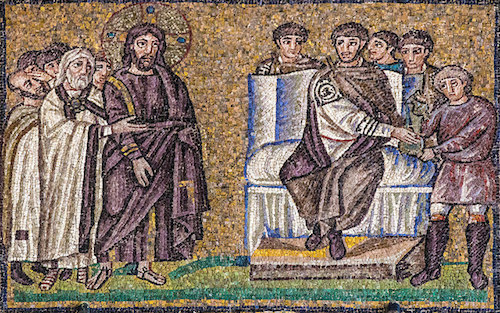We run our website the way we wished the whole internet worked: we provide high quality original content with no ads. We are funded solely by your direct support. Please consider supporting this project.

A Kingdom Not of This World
In the previous post, I introduced how Jesus directly taught against the favored nation status of Israel, an theme that runs throughout his ministry. For example, Yahweh’s Sinai covenant with Israel was rooted in a system of immediate rewards and punishments. Jesus not only canceled these covenantal promises; he sometimes explicitly reversed them. The Sinai covenant taught that those who obeyed God would be blessed with food and wealth, for example, while disobedience would result in hunger and poverty (e.g. Deut 27-28). Yet, Jesus pronounced woes on those who were well fed and wealthy while promising blessings to those who were hungry and poor (Lk. 6:20-21; 24-25).
Similarly, under the Sinai covenant those who obeyed God were promised they’d enjoy military victories over enemies and would possess the promised land. By contrast, Jesus taught that the humble and meek would inherit the earth, while those who showed mercy toward enemies and who were peacemakers would be blessed (Matt 5:5, 7,9; Lk 6:2).
Jesus’ assault on the Jewish nationalistic spirit of his day can also be seen in his interaction with a Roman Centurion (Mt. 8:5-10). Jesus not only obliged this commander’s plea to heal his servant; he commended his faith as being greater than that of any Jew he’d encountered. In the minds of many of his contemporaries, the Messiah was supposed to incite vengeance against officers like this, not serve them and praise them!
Along similar lines, Jesus violated customary Jewish taboos about fellowshipping with Samaritans, whom most Jews regarded as even further outside God’s favor than Gentiles. He even went so far as to make a hero of a Samaritan in one of his parables, contrasting his kindness with the calloused response of a Jewish priest and a Levite in the process (Lk 10:29-37).
Yet, Jesus’ most explicit repudiation of the nationalistic understanding of divine favor came in response to Pilate’s question about whether or not he was “king of the Jews.” Pilate was naturally wondering whether Jesus regarded himself to be on a par with, and therefore in competition with, his position as ruler of the land. “My kingdom is not of this world,” Jesus replied, citing the fact that his followers were not fighting on his behalf as proof of his claim (Jn. 18:36). Jesus was acknowledging that he was indeed a king, but not over any particular geographical region, any particular people, or any particular political regime. He was thus declaring that his kingdom was no more aligned with the nation of Israel than with any other nation. Whatever God was up to in working with a “favored” nation in the past, it’s evident that Jesus believed this nationalistic program had come to an end with him.
While it took some time for the Spirit to overcome the deeply entrenched nationalism and racism of Jesus’ earliest disciples—remember, some of them were expecting Jesus to restore Israel even after the resurrection (Acts 1)—we see Jesus’ trans-nationalistic view of the kingdom evidenced throughout the New Testament. In Jesus, Paul says, the distinction between Jew and Gentile has been abolished and “the dividing wall of hostility” has been “destroyed.” Indeed, in Christ God has created “one new humanity,” replacing the old fragmented humanity in Adam (Eph. 2:11-17). Hence, there is in Christ no longer any place for attaching any significance to one’s nationality or ethnicity—or, Paul adds, to one’s social standing, wealth or gender (Gal. 3:28).
Photo credit: Lawrence OP via Visual hunt / CC BY-NC-ND
Category: General
Tags: Israel, Kingdom of God, Nationalism
Related Reading

5 Distinctions of God’s Kingdom
Jesus said that his kingdom was “not from this world,” for it contrasts with the kingdom of the world in every possible way. This is not a simple contrast between good and evil. The contrast is rather between two fundamentally different ways of doing life, two fundamentally different mindsets and belief systems, two fundamentally different…

Friday Lights: Glimpse of the Kingdom
We interrupt the constant stream of violence and brokenness to bring you this glimpse of the Kingdom of God. Image via broken pencils are pointless

Love in Unexpected Places
Here’s a letter we received from a reader pointing us to this TED talk: Hi, My Name is Austin. I’ve been a podrishoner at Woodland Hills Church for the past 3 years and frequently visit reknew2015.wpengine.com. I stumbled upon this TED talk from September 2012 yesterday entitled Israel & Iran: A Love Story. Recently, Greg…

Introducing “TribeNet”
Hello Kingdom people, For years I’ve heard on a regular basis from individuals and small groups/house churches who wanted to know if there are others in their area that share their vision of a Jesus-looking God raising up a Jesus-looking people to transform the world in a Jesus kind of way. Along the same lines,…

Lighten Up: America is NOT the Kingdom of God
For some thoughts from Greg on the 4th of July and the Kingdom of God, see The Birth of Two Kingdoms: A Fourth of July Reflection. And now for one of the most ridiculous examples of confusing the Kingdom of God with America. This would be…

The Coming Kingdom & Racial Conflict
In the book of Revelation, we see a glimpse into the future. John says he saw, …a great multitude that no one could count, from every nation, tribe, people and language, standing before the throne and in front of the Lamb. They were wearing white robes and were holding palm branches in their hands. And…
